2024届高考英语复习专题:名词、代词和冠词课件(共36张PPT)
文档属性
| 名称 | 2024届高考英语复习专题:名词、代词和冠词课件(共36张PPT) |  | |
| 格式 | pptx | ||
| 文件大小 | 701.8KB | ||
| 资源类型 | 教案 | ||
| 版本资源 | 通用版 | ||
| 科目 | 英语 | ||
| 更新时间 | 2023-12-19 08:46:32 | ||
图片预览

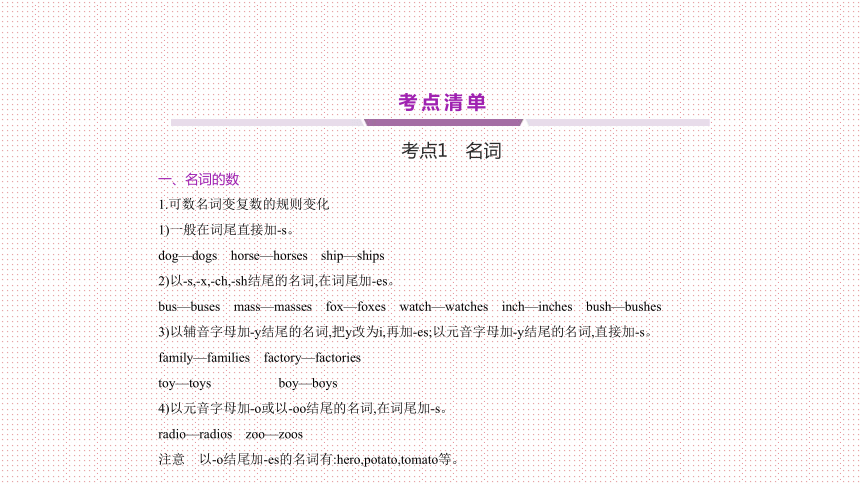
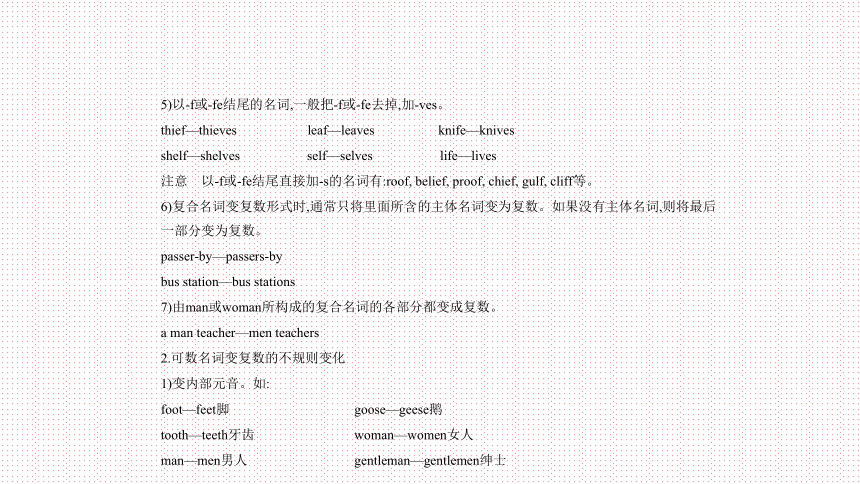
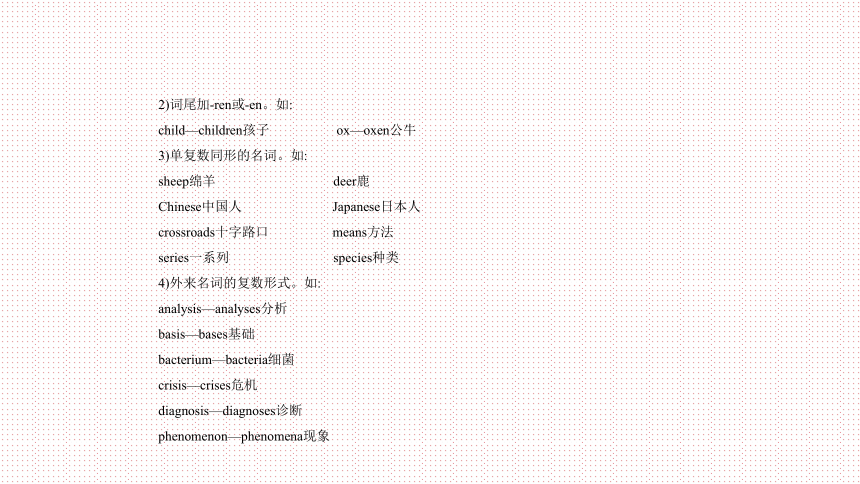
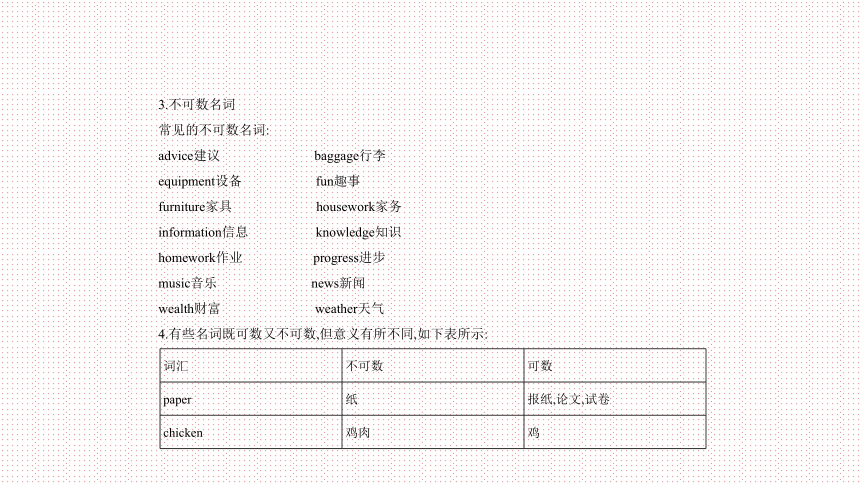
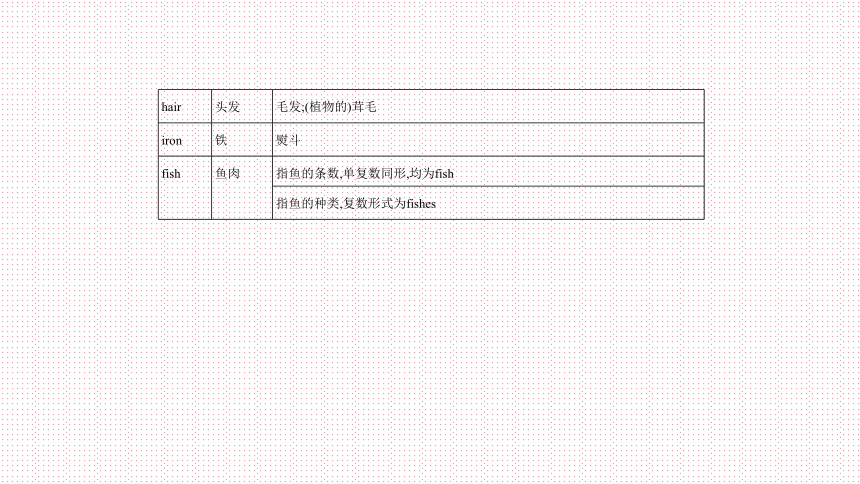
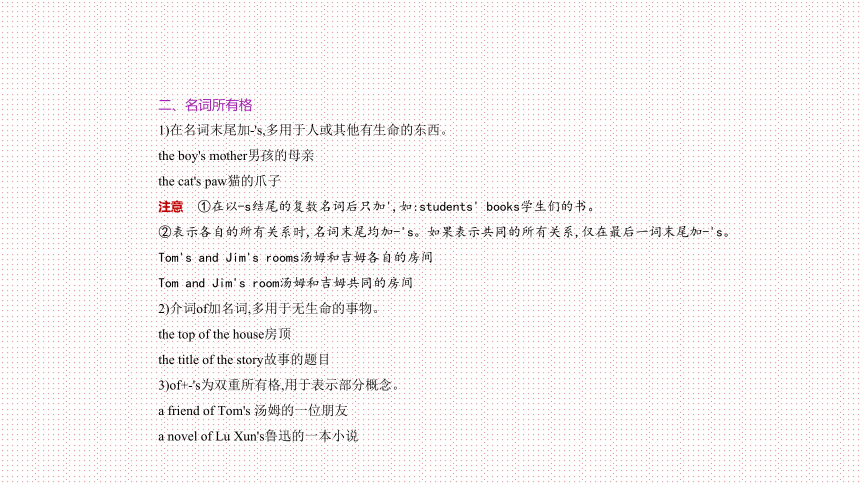
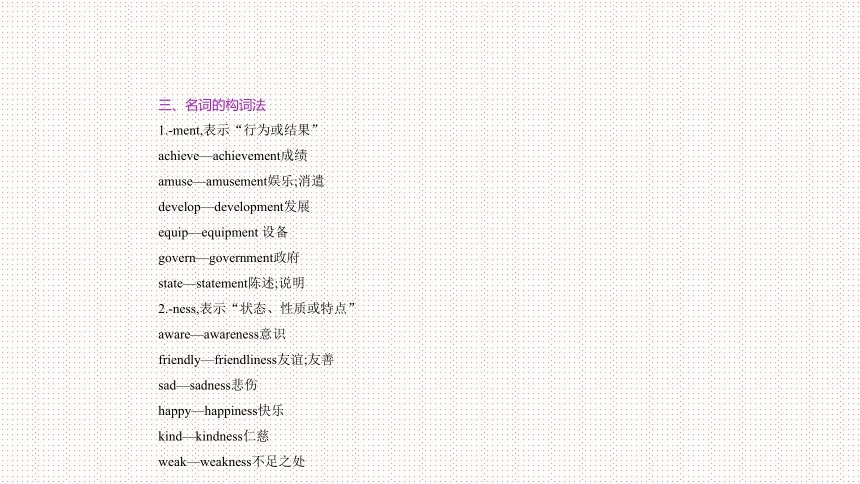
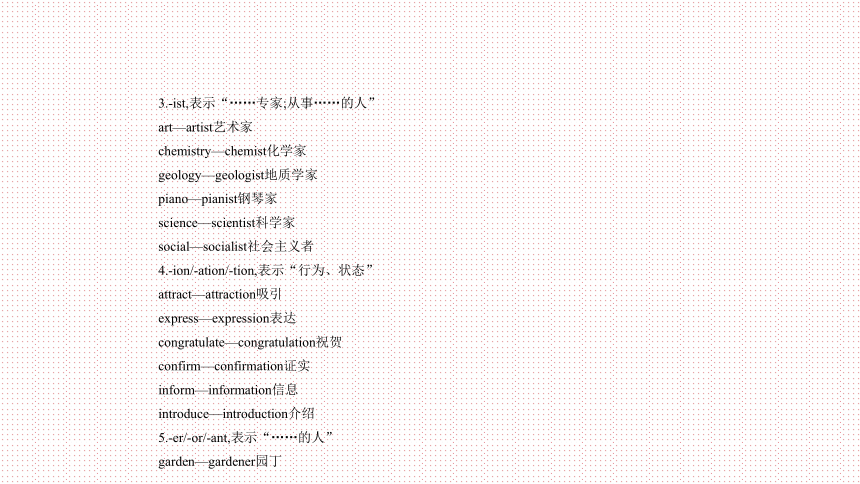
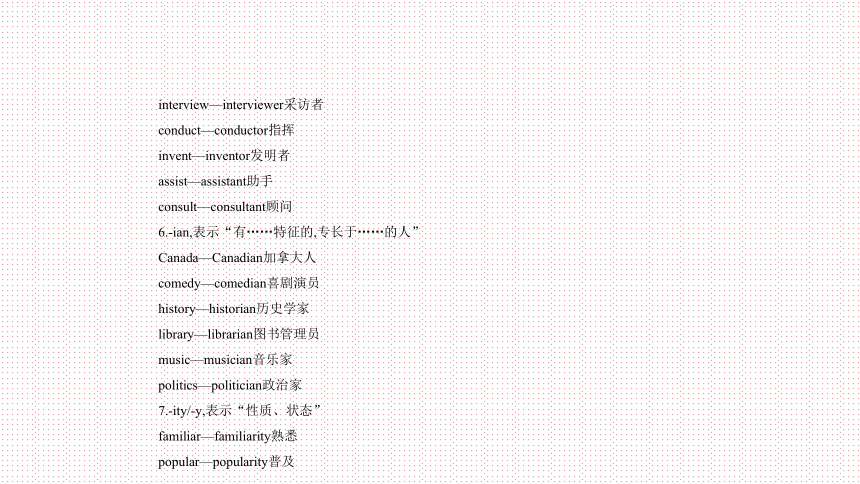
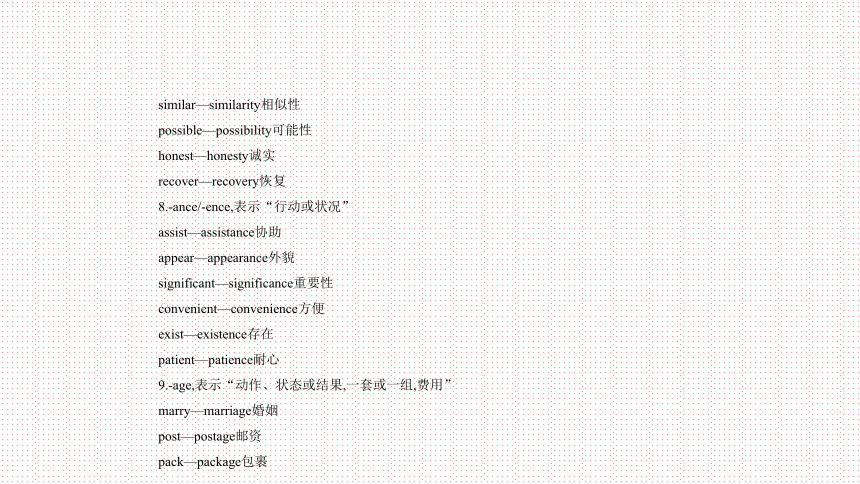
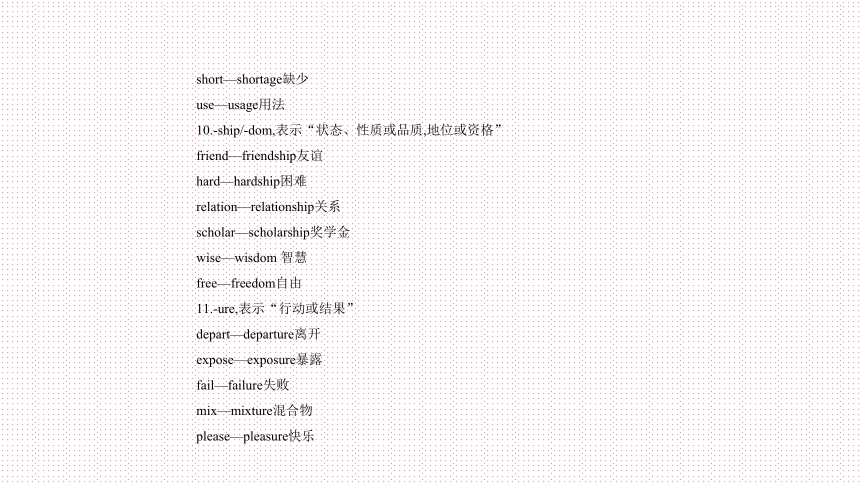
文档简介
(共36张PPT)
2024届高考英语复习专题★★名词、代词和冠词
2024届高考英语复习专题★★
考点1 名词
一、名词的数
1.可数名词变复数的规则变化
1)一般在词尾直接加-s。
dog—dogs horse—horses ship—ships
2)以-s,-x,-ch,-sh结尾的名词,在词尾加-es。
bus—buses mass—masses fox—foxes watch—watches inch—inches bush—bushes
3)以辅音字母加-y结尾的名词,把y改为i,再加-es;以元音字母加-y结尾的名词,直接加-s。
family—families factory—factories
toy—toys boy—boys
4)以元音字母加-o或以-oo结尾的名词,在词尾加-s。
radio—radios zoo—zoos
注意 以-o结尾加-es的名词有:hero,potato,tomato等。
考点清单
5)以-f或-fe结尾的名词,一般把-f或-fe去掉,加-ves。
thief—thieves leaf—leaves knife—knives
shelf—shelves self—selves life—lives
注意 以-f或-fe结尾直接加-s的名词有:roof, belief, proof, chief, gulf, cliff等。
6)复合名词变复数形式时,通常只将里面所含的主体名词变为复数。如果没有主体名词,则将最后
一部分变为复数。
passer-by—passers-by
bus station—bus stations
7)由man或woman所构成的复合名词的各部分都变成复数。
a man teacher—men teachers
2.可数名词变复数的不规则变化
1)变内部元音。如:
foot—feet脚 goose—geese鹅
tooth—teeth牙齿 woman—women女人
man—men男人 gentleman—gentlemen绅士
2)词尾加-ren或-en。如:
child—children孩子 ox—oxen公牛
3)单复数同形的名词。如:
sheep绵羊 deer鹿
Chinese中国人 Japanese日本人
crossroads十字路口 means方法
series一系列 species种类
4)外来名词的复数形式。如:
analysis—analyses分析
basis—bases基础
bacterium—bacteria细菌
crisis—crises危机
diagnosis—diagnoses诊断
phenomenon—phenomena现象
3.不可数名词
常见的不可数名词:
advice建议 baggage行李
equipment设备 fun趣事
furniture家具 housework家务
information信息 knowledge知识
homework作业 progress进步
music音乐 news新闻
wealth财富 weather天气
4.有些名词既可数又不可数,但意义有所不同,如下表所示:
词汇 不可数 可数
paper 纸 报纸,论文,试卷
chicken 鸡肉 鸡
hair 头发 毛发;(植物的)茸毛
iron 铁 熨斗
fish 鱼肉 指鱼的条数,单复数同形,均为fish
指鱼的种类,复数形式为fishes
二、名词所有格
1)在名词末尾加-'s,多用于人或其他有生命的东西。
the boy's mother男孩的母亲
the cat's paw猫的爪子
注意 ①在以-s结尾的复数名词后只加',如:students' books学生们的书。
②表示各自的所有关系时,名词末尾均加-'s。如果表示共同的所有关系,仅在最后一词末尾加-'s。
Tom's and Jim's rooms汤姆和吉姆各自的房间
Tom and Jim's room汤姆和吉姆共同的房间
2)介词of加名词,多用于无生命的事物。
the top of the house房顶
the title of the story故事的题目
3)of+-'s为双重所有格,用于表示部分概念。
a friend of Tom's 汤姆的一位朋友
a novel of Lu Xun's鲁迅的一本小说
三、名词的构词法
1.-ment,表示“行为或结果”
achieve—achievement成绩
amuse—amusement娱乐;消遣
develop—development发展
equip—equipment 设备
govern—government政府
state—statement陈述;说明
2.-ness,表示“状态、性质或特点”
aware—awareness意识
friendly—friendliness友谊;友善
sad—sadness悲伤
happy—happiness快乐
kind—kindness仁慈
weak—weakness不足之处
3.-ist,表示“……专家;从事……的人”
art—artist艺术家
chemistry—chemist化学家
geology—geologist地质学家
piano—pianist钢琴家
science—scientist科学家
social—socialist社会主义者
4.-ion/-ation/-tion,表示“行为、状态”
attract—attraction吸引
express—expression表达
congratulate—congratulation祝贺
confirm—confirmation证实
inform—information信息
introduce—introduction介绍
5.-er/-or/-ant,表示“……的人”
garden—gardener园丁
interview—interviewer采访者
conduct—conductor指挥
invent—inventor发明者
assist—assistant助手
consult—consultant顾问
6.-ian,表示“有……特征的,专长于……的人”
Canada—Canadian加拿大人
comedy—comedian喜剧演员
history—historian历史学家
library—librarian图书管理员
music—musician音乐家
politics—politician政治家
7.-ity/-y,表示“性质、状态”
familiar—familiarity熟悉
popular—popularity普及
similar—similarity相似性
possible—possibility可能性
honest—honesty诚实
recover—recovery恢复
8.-ance/-ence,表示“行动或状况”
assist—assistance协助
appear—appearance外貌
significant—significance重要性
convenient—convenience方便
exist—existence存在
patient—patience耐心
9.-age,表示“动作、状态或结果,一套或一组,费用”
marry—marriage婚姻
post—postage邮资
pack—package包裹
short—shortage缺少
use—usage用法
10.-ship/-dom,表示“状态、性质或品质,地位或资格”
friend—friendship友谊
hard—hardship困难
relation—relationship关系
scholar—scholarship奖学金
wise—wisdom 智慧
free—freedom自由
11.-ure,表示“行动或结果”
depart—departure离开
expose—exposure暴露
fail—failure失败
mix—mixture混合物
please—pleasure快乐
press—pressure压力
12.-th,表示“动作、过程或状态”
grow—growth成长;增长
strong—strength强度;优势
warm—warmth温暖
13.-ing,表示“行为或状态”
feel—feeling情感
fill—filling填料
learn—learning学习;学问
misunderstand—misunderstanding误会
surround—surroundings环境
suffer—suffering 苦难
14.-al,表示“过程或状态”
approve—approval赞成;批准
arrive—arrival到达
betray—betrayal背叛
deny—denial否认
refuse—refusal拒绝
survive—survival幸存
考点2 代词
一、人称代词、物主代词、反身代词
1.基本用法
类别 人称代词 物主代词 反身代词
主格 宾格 形容词性 名词性 功能 主语 宾语、表语 定语 主语、表语、宾语 宾语、表语
2.反身代词的习惯用法
adapt oneself to 适应
commit oneself to承诺,保证
devote oneself to致力于
enjoy oneself玩得开心
help oneself to 为(自己)取用
make oneself at home 不受拘束
teach oneself 自学
treat oneself to买(可享受的东西)
throw oneself into sth. 积极从事……
3.it的用法
1)it的指代用法
用法 例句
指代上文提到的某样东西 Where is my dictionary I left it right on the desk.
我的词典在哪里 我就把它放在书桌上了。
用以代替指示代词this,that —What's this 这是什么
—It's a flag.它是一面旗。
指不知性别的婴儿(baby)或身份不明确的人(由于某种原因而不知道对方是谁) The baby cried because it was hungry.这个婴儿因饥饿而啼哭。
—Who is knocking at the door
—It must be the milkman.
——谁在敲门
——一定是送奶工。
指时间、距离、天气、气候或温度 It is nine o'clock sharp now.
现在是9点整。
It is raining hard outside.
外面雨下得正大。
It is a long way to the factory.
到工厂有很长一段路。
2)it作形式主语的常用句型
①It is+n./adj./动词-ed+that...
It is a great honor that I have such a precious opportunity to make a speech here.
很荣幸有这么宝贵的机会在此发表演讲。
②It is+n./adj.(+for/of sb.)+to do sth.
It is impolite of you to fool a stranger.
你哄骗一个陌生人是不礼貌的。
③It is no use/no good doing sth.做某事没用/没好处
It is no use staying up late if you can't concentrate on your study.如果你不能专心学习,熬夜是没有用的。
④It takes sb. some time to do sth.做某事花费某人一些时间
It took him nearly ten years to translate the book.他花了将近十年时间翻译这本书。
⑤It occurs to/comes to/hits/strikes sb. that...某人突然想起……
It occurred to him that he had left his book in the library.
他突然想起来他把书落在了图书馆。
⑥It happens that... 碰巧……
It happened that I met an old friend of mine in the street last Sunday.
上周日,我碰巧在街上遇到了我的一位老朋友。
⑦It looks/seems as if/as though...看起来好像……
It seemed as if the world was at an end!
好像是世界末日到了!
⑧It seems/appears that...似乎/看起来……
It seems that no one knows what has happened there.
似乎没有人知道那里发生了什么。
3)it作形式宾语的常用句型
①主语+think/believe/suppose/consider/find/feel/...+it+adj./n.(+for/of sb.)+to do sth./that从句
I suppose it important to practice oral English every day.
我认为每天练习英语口语很重要。
②主语+think/believe/suppose/consider/find/feel/...+it+useless/no use/no good/...doing sth.
I feel it no use arguing with him.
我觉得与他争论没用。
③主语+appreciate/hate/love/like/dislike/prefer/...+it+if/when从句
I would appreciate it if you could let me know in advance whether or not you will come.如果你能提前
让我知道你是否要来,我将不胜感激。
④主语+see to(确保)/depend on(相信)/count on(期望)/...+it+that从句
Please see to it that you bring enough money when you go out.出门时,请确保带够了钱。
4)其他含it的常用句型
①When it comes to (doing) sth.当谈到(做)某事时……
When it comes to making friends on the Internet,different people hold different points of view.
当谈到网上交友时,不同的人持有不同的观点。
②It is the first time that sb. have/has done sth.这是某人第一次做某事
It is the first time that I have visited the Great Wall.这是我第一次游览长城。
③As sb. puts it...正如某人所说……
As someone puts it,practice makes perfect.
正如有人说的那样,熟能生巧。
④It has been some time since sb. did sth.某人做某事已经有一段时间了
It has been three years since he joined the army.他参军3年了。
⑤It was some time before sb. did sth. 过了一段时间,某人才做某事
It was three years before he came home.
过了3年,他才回家。
二、不定代词
1.all,both的区别
1)all(三个或三个以上人或物)都
All dogs are faithful animals.
所有的狗都是忠实的动物。
2)both(两个人或物)都
Both the girls are top students.
两个女孩都是尖子生。
2.either,neither,none的区别
1)either(两个人或物之中)任何一个
If you can sit still,you can sit on either side of the boat.如果你能坐着不动,那么你可以坐在船两侧的
任意一侧。
2)neither(两个人或物)都不
The research group produced two reports based on the survey,but neither contained any useful sugges-
tions.研究小组依据这个调查做了两份报告,但都没有包含任何有用的建议。
3)none(三个或三个以上人或物)都不
None of his classmates came to his birthday party.没有一位同学来参加他的生日派对。
3.another,the other的区别
1)another指三者或三者以上中的“另一,再一”。
There is something wrong with my computer. Please buy me another.
我的电脑出了毛病,请再给我买一台。
2)the other特指两者中的另一个,常用在“one..., the other...”结构中。
He held a pen in one hand and a book in the other.他一只手握笔,另一只手拿书。
4.others,the others的区别
1)others泛指别的人或物,常用在“some..., others...”结构中。
Some people waste a large quantity of food while others haven't enough to eat.一些人浪费大量食物,
而另一些人却食不果腹。
2)the others特指其余所有的人或物。
She's not less capable than the others in the class.她的能力并不比班里其他人弱。
5.nobody/no one,nothing,none的区别
代词 指代 用来回答 相当于 是否加of短语
nobody/no one 人 who not anybody/not anyone 否
nothing 物 what not anything 否
none 人或物 how many/how much not a/an/any+名词或no+名词 是
Nothing is more important than to protect the environment.
没有比保护环境更重要的事情了。
No one(Nobody/Not anyone) can be like you in my heart.
没有人可以取代你在我心中的位置。
If I had some money, I would lend you some, but unfortunately, I have none (not any money).
如果我有钱的话,我会借给你一些,但遗憾的是,我没钱。
6.many,much,few,little,a few,a little的区别
多 少
复数名词概念 many few
不可数名词概念 much little
复数名词概念 a few few
不可数名词概念 a little little
Many people don't have enough food.
许多人没有足够的食物。
Few people can live to be 100 years old.
很少有人能活到100岁。
Come in and have a little whisky.
进来喝点威士忌酒吧。
7.one, ones, the one, the ones, those(指示代词),that(指示代词)的区别
代词 替代 例句
one a/an+单数名词 The books are good. You can choose one.
这些书很好,你可以选一本。
ones 零冠词+复数名词 I like small cars better than large ones.和大型的车比起来,我更喜
欢小型的。
the one the+单数名词 The book is better than the one/that under the desk.
这本书比桌下的那本书好。
the ones the+复数名词 The books are better than the ones/those under the desk.这些书比桌子下的那些书好。
those the+复数名词(尤其是有后置定语时) that the+单数名词或不可数名词 The weather here is hotter than that of Changsha.
这儿的天气比长沙的天气热。
8.含复合不定代词的习惯用语
He is nothing but a clerk.他仅仅是一名职员。
He is anything but a clerk.他根本不是一名职员。
She is something of a doctor.她算得上是一位医生。
9.全部肯定、部分否定和全部否定
全部肯定 部分否定 全部否定
both not出现在含有表示全部肯定的不定代词的句子中 neither
all(+名词) none;not any(+名词);no+名词
everybody/every-one;everything;every+名词 nobody/no one;nothing
Not all of them smoke.=All of them don't smoke.他们当中不是所有的人都抽烟。
考点3 冠词
一、不定冠词的用法
1.不定冠词的基本用法
1)不定冠词有a,an两种形式,当冠词后的第一个音素为辅音音素(注意:不是辅音字母)时用a;当冠词
后的第一个音素为元音音素(注意:不是元音字母)时用an。
a European country a one-eyed dog
a university student a unique style
an hour an honor
an ugly man an X-ray
2)表示one,the same或every的意思。
They are of an (=the same) age.
他们年龄相同。
I will return in a (=one) day or two.
我将在一两天后回来。
2.用在某些固定短语中
all of a sudden突然
as a matter of fact事实上
as a rule通常;照例
at a loss困惑;不知所措
a matter of...一个……的问题
a sense of...一种……的感觉
for a while 暂时;一会儿
go on a diet节食
get a lift/ride搭便车
have a gift for...有……的天赋
have/take a rest休息一下
have a knowledge of知道
have a population of...有……人口
have a history of...有……的历史
have a try/go试一试
in a word总之
in a moment一会儿
in a hurry匆忙
in a sense从某种意义上说
in a way在某种程度上
make a living谋生
once in a while 偶尔
once upon a time 从前
take an interest in对……有兴趣
二、定冠词的用法
1)用在表示特指的人或物的名词前。
Sarah looked at the finished painting with satisfaction. 萨拉满意地看着已经画完的画。
2)用在年代、朝代名词或表示方位的名词前。
in the 2020's/2020s在21世纪20年代
the Tang Dynasty唐朝
the north北方/部
3)用在表示度量单位的名词前,表示“每一”,如:by the hour/day/week/month/year/dozen/yard/ton/
kilo,但是size,weight这类词跟by连用时不加定冠词。
We got paid by the month.我们按月领工资。
4)“the+形容词或分词”表示类指。
the old老人 the wounded伤员
the dying 垂死之人
Life is like an ocean;only the strong-willed can reach the other shore.人生就像一片海洋,只有意志坚
强的人才能到达彼岸。
5)“the+姓氏复数”表示一家人或夫妇二人。
The Smiths are going to move to London.
史密斯夫妇要搬到伦敦去。
6)“动词+sb.+介词+the+身体某一部位”结构中的the不可用物主代词代替。
An apple fell from the tree and hit him on the head.一个苹果从树上落下,砸在了他的头上。
7)用于江河湖海、山脉群岛、海湾、海峡等地理名词前。
The Yellow River is the cradle of Chinese culture.黄河是中华文化的摇篮。
8)用于含普通名词的国家、组织机构、建筑物、报纸杂志、会议条约等名词前。
As is known to all, the People's Republic of China is the biggest developing country in the world.众所
周知,中华人民共和国是世界上最大的发展中国家。
9)用在same,very,only前构成“the same/very/only+名词”的结构。
He is the very person I am looking for.
他正是我在找的人。
10)用在某些固定短语中
all the way一路上;自始至终
at the top of在顶部;用最高/大的速度、声音等
by the way顺便提一下
for the time being 暂时
for the most part 通常;多半
in the countryside在乡下
in the distance 在远处
in the meantime/meanwhile同时
in the long run从长远来看
in the way挡道;妨碍
in the playground在操场上
in the same way以同样的方式
in the course of在……期间
make the best of 充分利用
not in the least一点也不
on the whole 总的说来
on the left/right在左/右边
on the way在路上;即将到来
on the one hand...;on the other hand...一方面……;另一方面……
the other day 前几天
take the place of 取代
to tell the truth说实话;老实说
三、零冠词的用法
1)不可数名词、复数名词表泛指,用零冠词。
Horses are useful animals.马是有用的动物。
2)名词前已有this,that,my,your,some,each,any,no等限定词时,用零冠词。
He went to some place in France.
他去了法国某个地方。
3)月、季、星期、节日、洲、称呼、头衔、职务前,通常用零冠词。
A year can be divided into four seasons—spring, summer, autumn and winter.
一年可以分为四个季节——春、夏、秋、冬。
4)三餐、球类、惯用语、学科、棋类等名词前,用零冠词。
Playing football is my favorite.
我最喜欢踢足球。
5)用在某些固定短语中
all kinds of各种各样的
at risk 处于危险中
at war处于交战状态
at first起初
by heart 记住
by mistake 弄错
bear/keep sth. in mind记住
from hand to mouth勉强糊口
give way to 让路;让步
in case of如果
in honor/memory of 为了纪念
in return 作为回报
lose heart灰心,泄气
out of work失业
out of practice生疏
out of place不适当
on arrival 一到达
四、冠词的活用
1)抽象名词具体化:抽象名词表示泛指,与零冠词连用,但被具体化后可以和不定冠词连用。
surprise惊奇/a surprise一件意外的事情
success成功/a success一个(件)成功的人(事)
failure失败/a failure 一个(件)失败的人(事)
beauty美/a beauty 一个美丽的人(东西)
2)个体名词抽象化:个体名词被抽象化后与零冠词连用。
go to a school去一所学校
go to school去上学
3)专有名词普通化:专有名词不与冠词连用,但被普通化后表示泛指,要与不定冠词连用。
He is a Lei Feng in our class.
他是我们班的一个活雷锋。
There isn't a Mr. Chen here.
这里没有一位姓陈的先生。
4)表示世界上独一无二的事物的名词,如sun,moon,earth,universe,world等,常与定冠词连用,但该名
词前有形容词修饰时,可以与不定冠词连用。
The moon travels around the earth.
月亮围绕着地球转。
A bright moon is hanging in the sky.
一轮明月正悬挂在空中。
5)“the+形容词比较级”表示“较……的”;“a/an+形容词比较级”表示“更……的”。
Tom is the taller of the two boys.
汤姆是两个男孩中较高的那一个。
This pair of shoes is too small.Would you show me a bigger pair
这双鞋太小了。你能给我拿一双更大的吗
6)“the+形容词最高级”表示比较,意为“最……的”;“a/an+形容词最高级”意为“很,非
常”。
It is the most useful dictionary.
它是最有用的词典。
Haikou is a most beautiful coastal city.
海口是一个非常美丽的海滨城市。
7)“the+序数词”表示次序;“a/an+序数词”不表示与其他人或物排序,表示“再一,又一”。
It is the second time that he has visited the city.这是他第二次参观这座城市。
Could you give me a second chance
你能再给我一次机会吗
2024届高考英语复习专题★★名词、代词和冠词
2024届高考英语复习专题★★
考点1 名词
一、名词的数
1.可数名词变复数的规则变化
1)一般在词尾直接加-s。
dog—dogs horse—horses ship—ships
2)以-s,-x,-ch,-sh结尾的名词,在词尾加-es。
bus—buses mass—masses fox—foxes watch—watches inch—inches bush—bushes
3)以辅音字母加-y结尾的名词,把y改为i,再加-es;以元音字母加-y结尾的名词,直接加-s。
family—families factory—factories
toy—toys boy—boys
4)以元音字母加-o或以-oo结尾的名词,在词尾加-s。
radio—radios zoo—zoos
注意 以-o结尾加-es的名词有:hero,potato,tomato等。
考点清单
5)以-f或-fe结尾的名词,一般把-f或-fe去掉,加-ves。
thief—thieves leaf—leaves knife—knives
shelf—shelves self—selves life—lives
注意 以-f或-fe结尾直接加-s的名词有:roof, belief, proof, chief, gulf, cliff等。
6)复合名词变复数形式时,通常只将里面所含的主体名词变为复数。如果没有主体名词,则将最后
一部分变为复数。
passer-by—passers-by
bus station—bus stations
7)由man或woman所构成的复合名词的各部分都变成复数。
a man teacher—men teachers
2.可数名词变复数的不规则变化
1)变内部元音。如:
foot—feet脚 goose—geese鹅
tooth—teeth牙齿 woman—women女人
man—men男人 gentleman—gentlemen绅士
2)词尾加-ren或-en。如:
child—children孩子 ox—oxen公牛
3)单复数同形的名词。如:
sheep绵羊 deer鹿
Chinese中国人 Japanese日本人
crossroads十字路口 means方法
series一系列 species种类
4)外来名词的复数形式。如:
analysis—analyses分析
basis—bases基础
bacterium—bacteria细菌
crisis—crises危机
diagnosis—diagnoses诊断
phenomenon—phenomena现象
3.不可数名词
常见的不可数名词:
advice建议 baggage行李
equipment设备 fun趣事
furniture家具 housework家务
information信息 knowledge知识
homework作业 progress进步
music音乐 news新闻
wealth财富 weather天气
4.有些名词既可数又不可数,但意义有所不同,如下表所示:
词汇 不可数 可数
paper 纸 报纸,论文,试卷
chicken 鸡肉 鸡
hair 头发 毛发;(植物的)茸毛
iron 铁 熨斗
fish 鱼肉 指鱼的条数,单复数同形,均为fish
指鱼的种类,复数形式为fishes
二、名词所有格
1)在名词末尾加-'s,多用于人或其他有生命的东西。
the boy's mother男孩的母亲
the cat's paw猫的爪子
注意 ①在以-s结尾的复数名词后只加',如:students' books学生们的书。
②表示各自的所有关系时,名词末尾均加-'s。如果表示共同的所有关系,仅在最后一词末尾加-'s。
Tom's and Jim's rooms汤姆和吉姆各自的房间
Tom and Jim's room汤姆和吉姆共同的房间
2)介词of加名词,多用于无生命的事物。
the top of the house房顶
the title of the story故事的题目
3)of+-'s为双重所有格,用于表示部分概念。
a friend of Tom's 汤姆的一位朋友
a novel of Lu Xun's鲁迅的一本小说
三、名词的构词法
1.-ment,表示“行为或结果”
achieve—achievement成绩
amuse—amusement娱乐;消遣
develop—development发展
equip—equipment 设备
govern—government政府
state—statement陈述;说明
2.-ness,表示“状态、性质或特点”
aware—awareness意识
friendly—friendliness友谊;友善
sad—sadness悲伤
happy—happiness快乐
kind—kindness仁慈
weak—weakness不足之处
3.-ist,表示“……专家;从事……的人”
art—artist艺术家
chemistry—chemist化学家
geology—geologist地质学家
piano—pianist钢琴家
science—scientist科学家
social—socialist社会主义者
4.-ion/-ation/-tion,表示“行为、状态”
attract—attraction吸引
express—expression表达
congratulate—congratulation祝贺
confirm—confirmation证实
inform—information信息
introduce—introduction介绍
5.-er/-or/-ant,表示“……的人”
garden—gardener园丁
interview—interviewer采访者
conduct—conductor指挥
invent—inventor发明者
assist—assistant助手
consult—consultant顾问
6.-ian,表示“有……特征的,专长于……的人”
Canada—Canadian加拿大人
comedy—comedian喜剧演员
history—historian历史学家
library—librarian图书管理员
music—musician音乐家
politics—politician政治家
7.-ity/-y,表示“性质、状态”
familiar—familiarity熟悉
popular—popularity普及
similar—similarity相似性
possible—possibility可能性
honest—honesty诚实
recover—recovery恢复
8.-ance/-ence,表示“行动或状况”
assist—assistance协助
appear—appearance外貌
significant—significance重要性
convenient—convenience方便
exist—existence存在
patient—patience耐心
9.-age,表示“动作、状态或结果,一套或一组,费用”
marry—marriage婚姻
post—postage邮资
pack—package包裹
short—shortage缺少
use—usage用法
10.-ship/-dom,表示“状态、性质或品质,地位或资格”
friend—friendship友谊
hard—hardship困难
relation—relationship关系
scholar—scholarship奖学金
wise—wisdom 智慧
free—freedom自由
11.-ure,表示“行动或结果”
depart—departure离开
expose—exposure暴露
fail—failure失败
mix—mixture混合物
please—pleasure快乐
press—pressure压力
12.-th,表示“动作、过程或状态”
grow—growth成长;增长
strong—strength强度;优势
warm—warmth温暖
13.-ing,表示“行为或状态”
feel—feeling情感
fill—filling填料
learn—learning学习;学问
misunderstand—misunderstanding误会
surround—surroundings环境
suffer—suffering 苦难
14.-al,表示“过程或状态”
approve—approval赞成;批准
arrive—arrival到达
betray—betrayal背叛
deny—denial否认
refuse—refusal拒绝
survive—survival幸存
考点2 代词
一、人称代词、物主代词、反身代词
1.基本用法
类别 人称代词 物主代词 反身代词
主格 宾格 形容词性 名词性 功能 主语 宾语、表语 定语 主语、表语、宾语 宾语、表语
2.反身代词的习惯用法
adapt oneself to 适应
commit oneself to承诺,保证
devote oneself to致力于
enjoy oneself玩得开心
help oneself to 为(自己)取用
make oneself at home 不受拘束
teach oneself 自学
treat oneself to买(可享受的东西)
throw oneself into sth. 积极从事……
3.it的用法
1)it的指代用法
用法 例句
指代上文提到的某样东西 Where is my dictionary I left it right on the desk.
我的词典在哪里 我就把它放在书桌上了。
用以代替指示代词this,that —What's this 这是什么
—It's a flag.它是一面旗。
指不知性别的婴儿(baby)或身份不明确的人(由于某种原因而不知道对方是谁) The baby cried because it was hungry.这个婴儿因饥饿而啼哭。
—Who is knocking at the door
—It must be the milkman.
——谁在敲门
——一定是送奶工。
指时间、距离、天气、气候或温度 It is nine o'clock sharp now.
现在是9点整。
It is raining hard outside.
外面雨下得正大。
It is a long way to the factory.
到工厂有很长一段路。
2)it作形式主语的常用句型
①It is+n./adj./动词-ed+that...
It is a great honor that I have such a precious opportunity to make a speech here.
很荣幸有这么宝贵的机会在此发表演讲。
②It is+n./adj.(+for/of sb.)+to do sth.
It is impolite of you to fool a stranger.
你哄骗一个陌生人是不礼貌的。
③It is no use/no good doing sth.做某事没用/没好处
It is no use staying up late if you can't concentrate on your study.如果你不能专心学习,熬夜是没有用的。
④It takes sb. some time to do sth.做某事花费某人一些时间
It took him nearly ten years to translate the book.他花了将近十年时间翻译这本书。
⑤It occurs to/comes to/hits/strikes sb. that...某人突然想起……
It occurred to him that he had left his book in the library.
他突然想起来他把书落在了图书馆。
⑥It happens that... 碰巧……
It happened that I met an old friend of mine in the street last Sunday.
上周日,我碰巧在街上遇到了我的一位老朋友。
⑦It looks/seems as if/as though...看起来好像……
It seemed as if the world was at an end!
好像是世界末日到了!
⑧It seems/appears that...似乎/看起来……
It seems that no one knows what has happened there.
似乎没有人知道那里发生了什么。
3)it作形式宾语的常用句型
①主语+think/believe/suppose/consider/find/feel/...+it+adj./n.(+for/of sb.)+to do sth./that从句
I suppose it important to practice oral English every day.
我认为每天练习英语口语很重要。
②主语+think/believe/suppose/consider/find/feel/...+it+useless/no use/no good/...doing sth.
I feel it no use arguing with him.
我觉得与他争论没用。
③主语+appreciate/hate/love/like/dislike/prefer/...+it+if/when从句
I would appreciate it if you could let me know in advance whether or not you will come.如果你能提前
让我知道你是否要来,我将不胜感激。
④主语+see to(确保)/depend on(相信)/count on(期望)/...+it+that从句
Please see to it that you bring enough money when you go out.出门时,请确保带够了钱。
4)其他含it的常用句型
①When it comes to (doing) sth.当谈到(做)某事时……
When it comes to making friends on the Internet,different people hold different points of view.
当谈到网上交友时,不同的人持有不同的观点。
②It is the first time that sb. have/has done sth.这是某人第一次做某事
It is the first time that I have visited the Great Wall.这是我第一次游览长城。
③As sb. puts it...正如某人所说……
As someone puts it,practice makes perfect.
正如有人说的那样,熟能生巧。
④It has been some time since sb. did sth.某人做某事已经有一段时间了
It has been three years since he joined the army.他参军3年了。
⑤It was some time before sb. did sth. 过了一段时间,某人才做某事
It was three years before he came home.
过了3年,他才回家。
二、不定代词
1.all,both的区别
1)all(三个或三个以上人或物)都
All dogs are faithful animals.
所有的狗都是忠实的动物。
2)both(两个人或物)都
Both the girls are top students.
两个女孩都是尖子生。
2.either,neither,none的区别
1)either(两个人或物之中)任何一个
If you can sit still,you can sit on either side of the boat.如果你能坐着不动,那么你可以坐在船两侧的
任意一侧。
2)neither(两个人或物)都不
The research group produced two reports based on the survey,but neither contained any useful sugges-
tions.研究小组依据这个调查做了两份报告,但都没有包含任何有用的建议。
3)none(三个或三个以上人或物)都不
None of his classmates came to his birthday party.没有一位同学来参加他的生日派对。
3.another,the other的区别
1)another指三者或三者以上中的“另一,再一”。
There is something wrong with my computer. Please buy me another.
我的电脑出了毛病,请再给我买一台。
2)the other特指两者中的另一个,常用在“one..., the other...”结构中。
He held a pen in one hand and a book in the other.他一只手握笔,另一只手拿书。
4.others,the others的区别
1)others泛指别的人或物,常用在“some..., others...”结构中。
Some people waste a large quantity of food while others haven't enough to eat.一些人浪费大量食物,
而另一些人却食不果腹。
2)the others特指其余所有的人或物。
She's not less capable than the others in the class.她的能力并不比班里其他人弱。
5.nobody/no one,nothing,none的区别
代词 指代 用来回答 相当于 是否加of短语
nobody/no one 人 who not anybody/not anyone 否
nothing 物 what not anything 否
none 人或物 how many/how much not a/an/any+名词或no+名词 是
Nothing is more important than to protect the environment.
没有比保护环境更重要的事情了。
No one(Nobody/Not anyone) can be like you in my heart.
没有人可以取代你在我心中的位置。
If I had some money, I would lend you some, but unfortunately, I have none (not any money).
如果我有钱的话,我会借给你一些,但遗憾的是,我没钱。
6.many,much,few,little,a few,a little的区别
多 少
复数名词概念 many few
不可数名词概念 much little
复数名词概念 a few few
不可数名词概念 a little little
Many people don't have enough food.
许多人没有足够的食物。
Few people can live to be 100 years old.
很少有人能活到100岁。
Come in and have a little whisky.
进来喝点威士忌酒吧。
7.one, ones, the one, the ones, those(指示代词),that(指示代词)的区别
代词 替代 例句
one a/an+单数名词 The books are good. You can choose one.
这些书很好,你可以选一本。
ones 零冠词+复数名词 I like small cars better than large ones.和大型的车比起来,我更喜
欢小型的。
the one the+单数名词 The book is better than the one/that under the desk.
这本书比桌下的那本书好。
the ones the+复数名词 The books are better than the ones/those under the desk.这些书比桌子下的那些书好。
those the+复数名词(尤其是有后置定语时) that the+单数名词或不可数名词 The weather here is hotter than that of Changsha.
这儿的天气比长沙的天气热。
8.含复合不定代词的习惯用语
He is nothing but a clerk.他仅仅是一名职员。
He is anything but a clerk.他根本不是一名职员。
She is something of a doctor.她算得上是一位医生。
9.全部肯定、部分否定和全部否定
全部肯定 部分否定 全部否定
both not出现在含有表示全部肯定的不定代词的句子中 neither
all(+名词) none;not any(+名词);no+名词
everybody/every-one;everything;every+名词 nobody/no one;nothing
Not all of them smoke.=All of them don't smoke.他们当中不是所有的人都抽烟。
考点3 冠词
一、不定冠词的用法
1.不定冠词的基本用法
1)不定冠词有a,an两种形式,当冠词后的第一个音素为辅音音素(注意:不是辅音字母)时用a;当冠词
后的第一个音素为元音音素(注意:不是元音字母)时用an。
a European country a one-eyed dog
a university student a unique style
an hour an honor
an ugly man an X-ray
2)表示one,the same或every的意思。
They are of an (=the same) age.
他们年龄相同。
I will return in a (=one) day or two.
我将在一两天后回来。
2.用在某些固定短语中
all of a sudden突然
as a matter of fact事实上
as a rule通常;照例
at a loss困惑;不知所措
a matter of...一个……的问题
a sense of...一种……的感觉
for a while 暂时;一会儿
go on a diet节食
get a lift/ride搭便车
have a gift for...有……的天赋
have/take a rest休息一下
have a knowledge of知道
have a population of...有……人口
have a history of...有……的历史
have a try/go试一试
in a word总之
in a moment一会儿
in a hurry匆忙
in a sense从某种意义上说
in a way在某种程度上
make a living谋生
once in a while 偶尔
once upon a time 从前
take an interest in对……有兴趣
二、定冠词的用法
1)用在表示特指的人或物的名词前。
Sarah looked at the finished painting with satisfaction. 萨拉满意地看着已经画完的画。
2)用在年代、朝代名词或表示方位的名词前。
in the 2020's/2020s在21世纪20年代
the Tang Dynasty唐朝
the north北方/部
3)用在表示度量单位的名词前,表示“每一”,如:by the hour/day/week/month/year/dozen/yard/ton/
kilo,但是size,weight这类词跟by连用时不加定冠词。
We got paid by the month.我们按月领工资。
4)“the+形容词或分词”表示类指。
the old老人 the wounded伤员
the dying 垂死之人
Life is like an ocean;only the strong-willed can reach the other shore.人生就像一片海洋,只有意志坚
强的人才能到达彼岸。
5)“the+姓氏复数”表示一家人或夫妇二人。
The Smiths are going to move to London.
史密斯夫妇要搬到伦敦去。
6)“动词+sb.+介词+the+身体某一部位”结构中的the不可用物主代词代替。
An apple fell from the tree and hit him on the head.一个苹果从树上落下,砸在了他的头上。
7)用于江河湖海、山脉群岛、海湾、海峡等地理名词前。
The Yellow River is the cradle of Chinese culture.黄河是中华文化的摇篮。
8)用于含普通名词的国家、组织机构、建筑物、报纸杂志、会议条约等名词前。
As is known to all, the People's Republic of China is the biggest developing country in the world.众所
周知,中华人民共和国是世界上最大的发展中国家。
9)用在same,very,only前构成“the same/very/only+名词”的结构。
He is the very person I am looking for.
他正是我在找的人。
10)用在某些固定短语中
all the way一路上;自始至终
at the top of在顶部;用最高/大的速度、声音等
by the way顺便提一下
for the time being 暂时
for the most part 通常;多半
in the countryside在乡下
in the distance 在远处
in the meantime/meanwhile同时
in the long run从长远来看
in the way挡道;妨碍
in the playground在操场上
in the same way以同样的方式
in the course of在……期间
make the best of 充分利用
not in the least一点也不
on the whole 总的说来
on the left/right在左/右边
on the way在路上;即将到来
on the one hand...;on the other hand...一方面……;另一方面……
the other day 前几天
take the place of 取代
to tell the truth说实话;老实说
三、零冠词的用法
1)不可数名词、复数名词表泛指,用零冠词。
Horses are useful animals.马是有用的动物。
2)名词前已有this,that,my,your,some,each,any,no等限定词时,用零冠词。
He went to some place in France.
他去了法国某个地方。
3)月、季、星期、节日、洲、称呼、头衔、职务前,通常用零冠词。
A year can be divided into four seasons—spring, summer, autumn and winter.
一年可以分为四个季节——春、夏、秋、冬。
4)三餐、球类、惯用语、学科、棋类等名词前,用零冠词。
Playing football is my favorite.
我最喜欢踢足球。
5)用在某些固定短语中
all kinds of各种各样的
at risk 处于危险中
at war处于交战状态
at first起初
by heart 记住
by mistake 弄错
bear/keep sth. in mind记住
from hand to mouth勉强糊口
give way to 让路;让步
in case of如果
in honor/memory of 为了纪念
in return 作为回报
lose heart灰心,泄气
out of work失业
out of practice生疏
out of place不适当
on arrival 一到达
四、冠词的活用
1)抽象名词具体化:抽象名词表示泛指,与零冠词连用,但被具体化后可以和不定冠词连用。
surprise惊奇/a surprise一件意外的事情
success成功/a success一个(件)成功的人(事)
failure失败/a failure 一个(件)失败的人(事)
beauty美/a beauty 一个美丽的人(东西)
2)个体名词抽象化:个体名词被抽象化后与零冠词连用。
go to a school去一所学校
go to school去上学
3)专有名词普通化:专有名词不与冠词连用,但被普通化后表示泛指,要与不定冠词连用。
He is a Lei Feng in our class.
他是我们班的一个活雷锋。
There isn't a Mr. Chen here.
这里没有一位姓陈的先生。
4)表示世界上独一无二的事物的名词,如sun,moon,earth,universe,world等,常与定冠词连用,但该名
词前有形容词修饰时,可以与不定冠词连用。
The moon travels around the earth.
月亮围绕着地球转。
A bright moon is hanging in the sky.
一轮明月正悬挂在空中。
5)“the+形容词比较级”表示“较……的”;“a/an+形容词比较级”表示“更……的”。
Tom is the taller of the two boys.
汤姆是两个男孩中较高的那一个。
This pair of shoes is too small.Would you show me a bigger pair
这双鞋太小了。你能给我拿一双更大的吗
6)“the+形容词最高级”表示比较,意为“最……的”;“a/an+形容词最高级”意为“很,非
常”。
It is the most useful dictionary.
它是最有用的词典。
Haikou is a most beautiful coastal city.
海口是一个非常美丽的海滨城市。
7)“the+序数词”表示次序;“a/an+序数词”不表示与其他人或物排序,表示“再一,又一”。
It is the second time that he has visited the city.这是他第二次参观这座城市。
Could you give me a second chance
你能再给我一次机会吗
